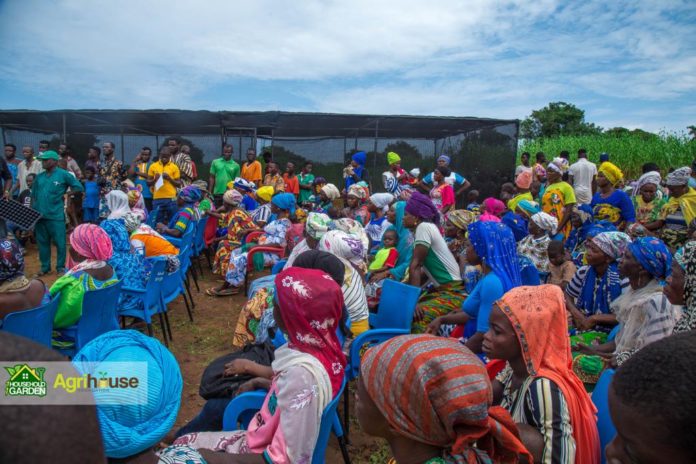In a bid to bridge food security and reduce poverty among vulnerable women and people living with disability in Ghana, Agrihouse Foundation has commenced phase two of 1Household 1Gadern (1H1G) capacity in the North East Region of Ghana.
The new project (1H1G) which started in the Northern Region in August with financial support from USAID’s Feed the Future initiative through AGRA aimed at equipping women in small-scale farming to reduce poverty and contribute to food security in the country.
Today at Dagbriboari, over 300 beneficiaries from Dagbriboari, Gambaga, Nalerigu, Tamboaku, and Bowku received training on backyard farming and organic compost preparation. Beneficiaries in the subsequence days will receive trays of vegetable seedlings, seeds, gardening tools, organic fertilizers, and pesticides.
Nasarah Edward, the Regional Agric Officer, North East region said the 1H1G project initiated by Agrihouse foundation is a well-welcoming project which is per regional agric office programs in the region.
He explained that the training will go a long way to improve the health status of his people and reduce poverty and food security in the country.
Mr. Nasarah Edward added that his outfit is ready to work with Agrihouse Foundation to ensure the knowledge and the skills obtained from the training acquired are well utilized. He lauded Agrihouse Foundation and its partners for bringing alive backyard farming in North East region.
Speaking on behalf of the chief of Dagbriboari, Kpanzuran Musah, Abu Wunbe said said ” we the residence are overwhelmed to see this happening in our community today, we will make sure we do not let go of the knowledge acquired today, thank you”, he said
Mahami Fusheina, a visionary impediment and a beneficiary of 1H1G, expressed her gratitude to Agrihouse foundation, USAID, and AGRA for remembering them.
“I’m a backyard farmer and through this training, I know that before nurturing, I have to sterilise the soil; this will help us a lot by producing fresh vegetables, eating fresh vegetables, and even selling some. May Allah bless you all for training us, thank you”.
For the time being, the 1H1G initiative will be implemented in 17 districts in the Northern, North East, Upper West, and Upper East Regions of Ghana. It is expected to train 2,000 households and 10 public schools on backyard farming and organic compost preparation. Beneficiaries will also receive trays of vegetable seedlings, seeds, gardening tools, organic fertilizers, and pesticides.








